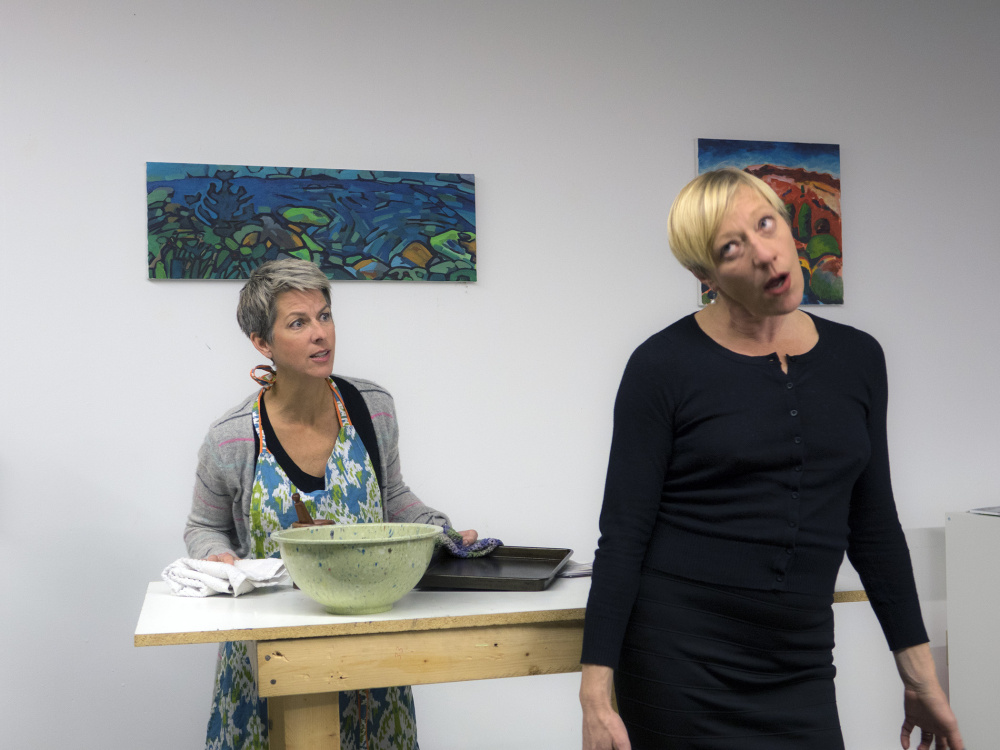When the news is filled with sorrowful events, it’s nice to spend an evening with playwright Bess Welden’s everyday American family and their familiar emotional struggles in her play “Madeleines,” despite the one-act’s tough moments.
Welden seems to know that her audience could be familiar with her characters, two sisters, played by Karen Ball and Julia Langham – her funny lines depend on our own stories to resonate. Their mother’s differing treatment of them as children haunts them and stokes their sibling rivalry.
But if this is known territory to many of us, Welden’s play, directed by Ann Tracy and clocking in at 45 minutes at Portland Stage Company’s Studio Theater, is also rich with the kind of discoveries that human beings both fear and yearn for. The actors also play mother Rose, a device that serves nicely to show how the connections between mother and daughters, and between the distanced sisters, are stronger than they realize.
The audience meets Rose first and so is privy to aspects of her life – the creativity she nurtures as the baker of cookies for her father’s deli and her love of poetry as a girl – that her daughters aren’t quite aware of at first. Rose and her parents were immigrants at a time, as many of our parents and grandparents knew too well, when health could be precarious and ambitions were easily thwarted by the practical burdens of making a better life in America.
“I did my homework in 12-minute stretches,” Rose tells us, as we learn how she developed what would be a lifelong endeavor of making a life with baking. The play is front-loaded with monologue and lists of Yiddish, Hebrew and foodie words that show how much immigrants bring with them when they arrive.
The play really comes alive, though, as the sisters spar over their present and their past, each learning details about the other that complicate their entrenched competition.
Welden has a special relationship with food, as anyone who saw her lively, poignant one-woman show, “Big Mouth Thunder Thighs,” already realizes, and she cuts her cookies to great effect here. We know that Rose, toward the end of her life, is suffering when she mistakes salt for sugar, and that the obsessive way she ordered her recipes was her attempt to force her life into making sense. The madeleines of the title are a Rose specialty, for a reason that deepens the sisters’ appreciation for their mother’s struggles – and unsettles them.
Set designer Meg Anderson makes excellent use of Portland Stage’s small black studio space, with details from the ’70s and a black-and-white checked linoleum floor that will make Generation Xers and baby boomers in particular smile.
Marcel Proust, of course, famously employed madeleines to demonstrate how memories are inevitably limited and so don’t fully deliver the true essence of our past. “Madeleines” accepts that premise and adds a pinch of revelation that, despite all that, it’s not too late to connect.
Daphne Howland is a freelance writer based in Portland.
Send questions/comments to the editors.



Success. Please wait for the page to reload. If the page does not reload within 5 seconds, please refresh the page.
Enter your email and password to access comments.
Hi, to comment on stories you must . This profile is in addition to your subscription and website login.
Already have a commenting profile? .
Invalid username/password.
Please check your email to confirm and complete your registration.
Only subscribers are eligible to post comments. Please subscribe or login first for digital access. Here’s why.
Use the form below to reset your password. When you've submitted your account email, we will send an email with a reset code.